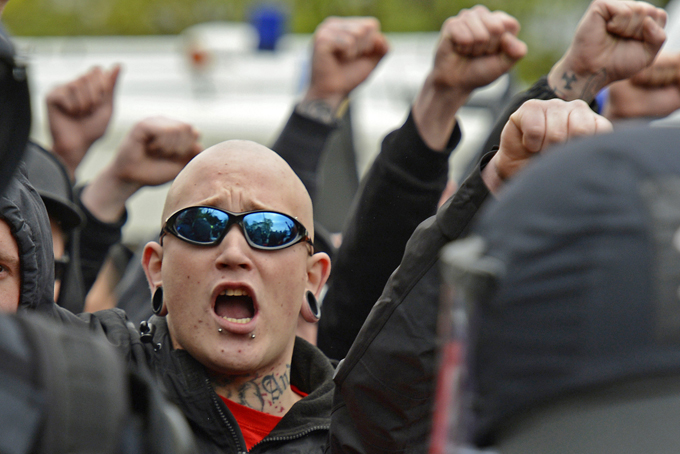
THE HAGUE, Netherlands (AP) – The top-selling Dutch newspaper has apologized for a story on its website that linked the death of anti-apartheid icon Nelson Mandela with a controversial black-face character in the traditional Dutch celebration of Sinterklaas.
In the opening sentence of an article collating reactions to Mandela’s death, De Telegraaf said Friday that Mandela “died on the very night of St. Nicholas and Black Pete.”
Black Pete is the helper of Saint Nicholas, known in the Netherlands as Sinterklaas, who brings children gifts on Dec. 5. Black Pete traditionally is portrayed by people in black-face makeup.
The character has been the focus of a fierce debate in the Netherlands recently between fans of the Sinterklaas tradition and opponents who call Black Pete a racist throwback.
The Telegraaf blamed the “tasteless link” on “an unfortunate convergence of circumstances.”

BERLIN (AP) — Hundreds of unsolved killings and attempted killings in Germany over the past two decades may have been committed by far-right extremists, officials said Wednesday.
The stark admission comes two years after police acknowledged that a series of murders they had initially linked to immigrant criminal groups was likely the work of a secretive neo-Nazi group.
The case prompted a fundamental review of Germany’s security services, including the way they classify crimes.
An Interior Ministry spokesman said authorities have completed an initial review of more than 3,300 unsolved cases between 1990 and 2011, looking for signs of a possible far-right motive.
“In a total of 746 cases across Germany there were leads in that direction,” Hendrik Loerges told reporters in Berlin.
“Let me stress that at the moment there are only indications that may not stand up to scrutiny,” he said, adding that officials would now begin examining each case more closely.
The probe was first reported Wednesday by Germany’s Neue Osnabruecker Zeitung newspaper.
The announcement was welcomed by anti-racism activists, who have long criticized the criteria used by German authorities to decide whether a hate crime has been committed.
Currently some 63 killings during the 21-year period are classified as far-right “politically motivated crimes.” But the official definition gives police a lot of room for judgment — especially if there is no suspect to explain his or her motives. It can also differ among Germany’s 16 states.
“This investigation is a positive move toward greater transparency,” said Anetta Kahane, who chairs the Amadeu Antonio Foundation, an activist group. “Germany really needs to face up to the extent of far-right crime.”
Kahane’s group claims 184 far-right killings have taken place since 1990, the year of German reunification. A surge of racist violence followed that event, particularly in the formerly communist east and poorer parts of the west.
The probe ends with cases from 2011. Late that year, the self-styled National Socialist Underground emerged as suspects behind the murder of eight Turkish men, a Greek and a policewoman between 2000 and 2007. The group, whose sole surviving alleged member is currently on trial, also is suspected of carrying out two bombings in which dozens of people were
injured.
Police had long ruled out a far-right motive in any of those cases and linked some of the immigrant victims to organized crime, leading to accusations of institutional racism.
The German government has pledged to reform the country’s security services to prevent similar cases from occurring in future.
“There’s no doubt that the NSU murder series exposed structural and organizational problems,” government spokesman Steffen Seibert said Wednesday.
Brazil police investigate school for racism
SAO PAULO (AP) – Brazil police say they are investigating a school for suspected racism after it allegedly refused to re-enroll an 8-year-old boy because of his natural Afro hairstyle.
Police inspector Flavio Simao says Lucas Neiva’s mother filed a complaint against the private Cidade Jardim Cumbica School in the Sao Paulo suburb of Guarulhos, saying she was told her son’s hairstyle “did not conform to school standards.”
The mother refused the school’s request that she cut her son’s hair. When she tried to enroll him for the 2014 school term, she was told there was no room for him.
The school’s administration office said no one was available to comment.
Racism is illegal in ethnically diverse Brazil, punishable by up to five years in prison.
Austria: mayor quits over alleged racist comments
VIENNA (AP) – The mayor of an Austrian village says he’s resigning after being accused of racist and anti-Semitic comments.
Karl Simlinger has denied some of the remarks attributed to him by an opposition member of the village council. But on Friday he acknowledged making a statement that “grossly contravenes my convictions and my personal views.”
Simlinger didn’t specify what he meant, but may have been referring to accusations that he had likened foreign asylum-seekers in Austria to excrement and said journalists should be hanged “like the Jews.”
Simlinger allegedly made the comments during discussion about building a home for refugees in his village of Gfoehl, about 70 kilometers (40 miles) northwest of Vienna.
In Austria, such remarks are a crime and an anti-racist group is pressing charges against Simlinger.